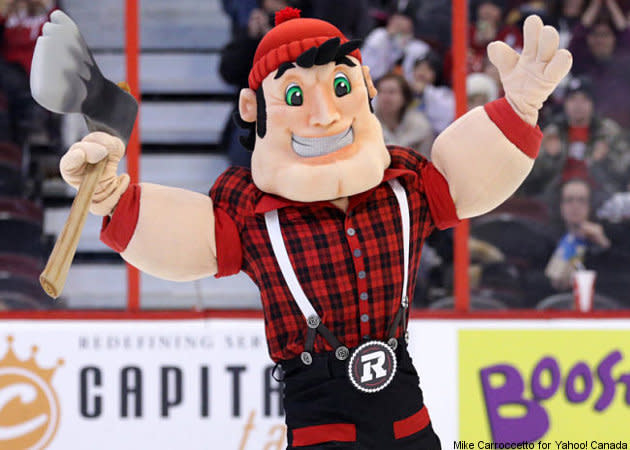Big Joe/Grand Jos compromise shows multiple sides of history, could help build Ottawa fanbase

While the Ottawa Redblacks changing their mascot's name from Big Joe Mufferaw after people took offence may seem funny at first to the rest of Canada, the Big Joe/Grand Jos compromise actually makes plenty of sense, as Neate Sagerdetailed here earlier this week. The Ottawa franchise needs to appeal to both anglophones and francophones to have a chance at long-term success, and the new name should do that. There's been an unexpected side benefit to this controversy, though; it's proven to be a chance to discuss the history of both the largely-fictional Mufferaw and the very-real Jos Montferrand, whose life inspired many of the Mufferaw legends. Tom Spears explores the history behind the name in this excellent Ottawa Citizenpiece:
Nearly lost in tall tales of Jos Montferrand’s strength, beating up 50 Irish raftsmen and all that, is this perspective on why his heritage matters: “Unable to realize their visions, French Canadians, between 1840 and 1880, built a symbolic country in their ideology, their legends, their literature, and their art. In the struggle they continued to wage against the English and against nature, French Canadians found hope and greater self-respect in the Montferrand legend.
“The legend has not died out. It still lives in town and countryside, and reappears with more vigour than ever in difficult periods.”
That’s written by historians Gérard Goyer and Jean Hamelin in the Dictionary of Canadian Biography. ...
Young Montferrand first drove a cart, but was eventually lured by money, or love of the outdoors, to work for the Hudson’s Bay Company.
After a few years he moved on to shanty work for various lumber barons. Logging took him along the rivers of Lower Canada and also the Upper Ottawa River, working in the camps all winter and driving the logs downstream to the mills in spring.
Once back in town there was always another fight to win. He won most of them.
Tales of his strength and agility spread:
• He could hold up a plow at arm’s length with one hand.
• In a hotel bar beside the Le Lièvre River he once jumped up and left the mark of his boot heel mark on the ceiling, landing on his feet.
• He beat maybe 50, perhaps 150, “Shiners” who attacked him on the bridge between Hull and Bytown.Shiners were Irish workmen brought to Canada to build the Rideau Canal. Once the canal was finished they looked for work as shantymen and raftsmen, which put them in competition with French-Canadian raftsmen.
(The word Shiner comes from the French chêneur: Someone who works with oak.)
There was violence between the groups for several years, and the Montferrand story claims he picked up one Shiner by the legs and whirled him around as a weapon to deal with the rest.
There's much more in there, including about how the knowledgeable Montferrand excelled with his brains as well as his brawn, finding great success as a raft guide and shanty foreman. It's a fascinating piece that shows there's plenty of reality as well as legend to the story of Montferrand, and it explains why many francophones were annoyed to see a mascot named "Mufferaw", a deliberate Anglicization of the real French-Canadian hero. However, the English tradition of Mufferaw's story isn't all bad, either, and in particular, the song from Canadian music legend (and noted CFL fan) Stompin' Tom Connors stands out as a way to pass on tales of "the best man in Ottawa" to a new audience:
There's plenty to like in each tradition, and that illustrates the logic behind the Redblacks' decision to switch to "Big Joe/Grand Jos." It's a perfect mascot for a team that's trying to base its identity on the area's historical logging ties (sometimes campily), and it's one that should hopefully work for both the anglophone and francophone fanbases. That's not always an easy line to walk, but it needs to be done; both groups will have to be on board if the Redblacks are going to have any sustained success. The mascot move seems like a step in the right direction there, and hopefully it will be just the start for a franchise that can appeal to everyone around Ottawa, regardless of their language of choice.


